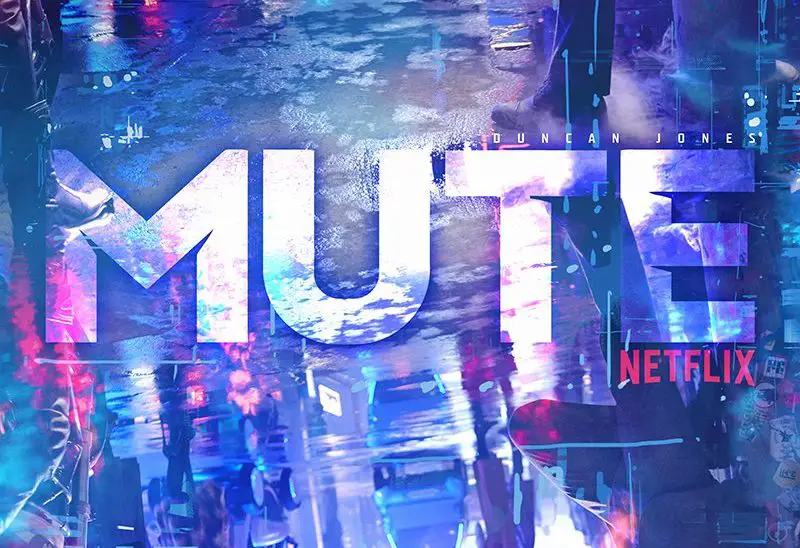Duncan Jones is an optimist. At one point, many believed that the son of David Bowie would lead the revival of science fiction film. However, after the financial and critical mega-failure of “Warcraft,” an adaptation of the popular video game franchise, this hope faded into obscurity.
It was an unfortunate turn of events, but not the end for Jones. The director’s prior cinematic outings hold two gifts uncommon to mainstream film today: they’re both intelligent and original.
And despite the drastically negative reception to “Warcraft,” the filmmaker switched gears and returned to science fiction with “Mute,” a passion project whose roots can be traced to the beginning of Jones’ cinematic career.
This “Blade Runner”-inspired film earned Jones a pass in my heart, and on paper the movie radiates with potential. The plot focuses on a mute, Amish bartender delving deep into the criminal underground of a futuristic Germany in search of his missing girlfriend.
Whatever one could say about the final product, it’d be unfair to deny the amount of imagination or ingenuity injected into the framework of the film.
That being said, “Mute” isn’t great. It’s still far from the worthless slop many critics proclaim it to be; the film currently holds a 13 percent rating on Rotten Tomatoes and 5.4 (out of 10) stars on IMDb. The film isn’t without its share of problems, and for the lack of a better phrase, “Mute” feels slightly outdated.
However, this article isn’t meant to be an analysis of the movie’s merits. Rather, I’d like to discuss what I identify as the underlying flaw to “Mute,” which rests in the overarching faults of the cyberpunk genre.
Now, you may be asking yourself a silly question: What is cyberpunk? If you’ve ever seen “Blade Runner,” there’s your answer. If not, please don’t ever speak to me again, but first allow me to explain.
Cyberpunk is a subgenre of science fiction with takes place in a future of overpopulated, neon-soaked cities where it constantly rains. The residents of these cities dress in the worst clothes displayed at New York Fashion Week and live under the iron fists of ominous corporations.
Throw in a cynical protagonist, a femme fatale and a handful of references to Japanese culture. Then add a trench coat or two and there you go: everything you need for a cyberpunk classic.
It might sound like I’m criticizing the subgenre, but to be honest, I love cyberpunk. I find cyberpunk to be an endlessly entertaining aesthetic, though I doubt even the most loyal of fans would defend its derivative and repetitive nature. Cyberpunk, at its core, is an evolution of film noir, the cinematic staple of Hollywood in the ‘40s and ‘50s.
Film noir meant murder mysteries and rainy, dark cities. It was populated by men like Humphrey Bogart with fedoras and revolvers and Marilyn Monroe lookalikes casting dubiously flirty eyes at the troubled private investigator. Cyberpunk has a similar setting and similar characters, only with more robots and rayguns.
Times have changed since the mid-1900s, but cyberpunk hasn’t. The genre relishes in the past more than it attempts to push boundaries, which may explain why it fell out of favor. After all, flying cars, psychotic automatons and wacky limb implants are always fun to see, but how relevant are they?
This stagnation could explain why Jones’s newest film seems so dated. “Mute” has very little to say; I didn’t realize the irony in this sentence until I wrote it, but it’s true.
This would be a terrible condemnation for any movie, but especially drastic in a science fiction story. After all, most of the best futuristic science fiction stories are commentary on the present, exploring the issues of the real world.
Take “Ex Machina,” for example. Alex Garland’s directorial debut doesn’t include a dystopic society; instead, it focuses on the conversations of two ordinary men under extraordinary circumstances. While it may initially appear trite, the result is a plausible glimpse into the future.
“District 9” by Neill Blomkamp takes a similar tack. Featuring grasshopper-roach hybrids for heroes, it tells an uncomfortably relevant story for our time. The old trope of the alien invasion transforms into a tale of maligned refugees from another world.
Despite its problems, “Black Mirror” remains a satirical gem of speculative science fiction. The Netflix series terrifies its viewers with technology that already exists or might become feasible in a few decades. Where cyberpunk takes Olympic-like hurdles in logic, “Black Mirror” takes baby steps.
However, this improbability remains the fundamental attraction of the subgenre. Cyberpunk is an escape from reality. It portrays a future where absolutely anything is possible, and there’s an intrinsic romance to the setting. The sprawling metropolis where rain-soaked androids dart corners to the stabbing sounds of synths serves as a sort of futuristic, adult-friendly fairytale.
Maybe it lacks deep philosophical questions or warnings about the future, but this sort of fiction serves a purpose. Not all sci-fi needs to be about how your laptop could develop its own soul and murder you in your sleep. Sometimes we just need a vicarious adventure through a rainy, neon-colored metropolis of robots and clones.
The influence of the subgenre is inarguably extensive; its best-known products are probably “The Matrix” and “Blade Runner,” two of the most stylistically influential movies of all time. Also, the discrepancy between film noir’s cynicism and glitzy club culture creates a thought-provoking dynamic.
This dynamic offers a considerable margin for creative freedom which, if placed in capable hands, may give birth to a classic.
For better or worse, cyberpunk has returned to the mainstream after falling off near the turn of the century. Recent additions such as the “Ghost in the Shell” remake and “Blade Runner: 2049” haven’t fared well at the box office; still, the latter was well-received by audiences and critics alike.
Genre problems notwithstanding, “Mute” is still an entertaining flick. There aren’t any moral lessons or symbolic political statements, but the themes of sacrifice, identity and family run through the movie. And to be honest, perhaps an entertaining 126 minutes was all Jones intended to accomplish in the first place.
If Jones keeps following this trajectory, the director may find himself leading the new school of neo-cyberpunk filmmakers. It would be a deserving title to bestow upon the director. He’s a visionary in his own right, and I look forward to seeing what he does next.

















